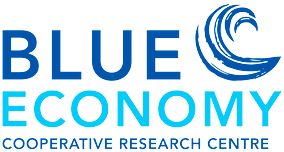Webinar: Offshore Aquaculture Units and Support Vessels: Challenges and Industry Approaches
Wednesday 11th November, 4-5pm (AEDT)
The recent establishment of the Blue Economy CRC is aimed at unlocking the potential of the nation’s ocean resources, through the sustainable development of offshore seafood and renewable energy production systems.
Included in these prospects for blue growth is the co-location and/or integration of both seafood and renewable energy production systems, which can potentially have several synergistic benefits, among these include shared resources, efficient use of ocean space, less competition amongst other user groups of marine space, reduced operational and maintenance (O&M) costs from possible shared activities.
However, sites located further offshore generally have a more severe wave climate year-round compared to nearshore or coastal sites. Scheduling for all forms of operations for both the offshore renewable energy (e.g., a wind farm) and aquaculture farms, including installations and decommissioning, depends on available weather windows at the specific offshore site.
For instance, loading or unloading of live fish stocks in floating aquaculture pens may be more sensitive to sea states, and are typically longer in duration than an O&M visit for an offshore wind turbine where increased wave heights is an impediment only to vessels under seaway for transfer of personnel.
In this webinar, you will hear from two industry experts talking about these aspects and challenges and the current industry approaches to these issues.
Presentation 1
Presented by Mr Per Arild Åland (DNV.GL)
DNV.GL approach to de-risking offshore aquaculture units by applying tried-and-tested maritime classification concepts
Presentation 2
Presented by Mr Ben Corden-McKinley (BMT)
BMT design for safe transfer of crew to offshore wind farms – vessel design requirements, and what crew transfer requirements are expected for offshore aquaculture operations
Presenters
 Name: Mr Per Arild Åland
Name: Mr Per Arild Åland
Affiliation: DNV.GL
Bio: Mr Per Arild Åland has an MSc from University of Surrey, England combined with business and economics studies at universities in Norway. Per Arild has been working with advanced offshore service vessels and offshore installations as well as digitization for most of his 25 years in the marine & offshore industry. Amongst the specialist areas throughout his career, Per Arild has been working are supply chain management, capability review of suppliers & shipyards, CE-marking, risk assessments and system/software integrity. Over the last few years Mr. Aland has been involved in ensuring safety and operational excellence in the emerging segments of offshore renewables and exposed fish farming/aquaculture. He is currently attending to Offshore Classification and Business Development at DNV GL Head Office, Oslo.
 Name: Mr Ben Corden-McKinley
Name: Mr Ben Corden-McKinley
Affiliation: BMT
Bio: Ben Corden-McKinley is a Naval Architect with 6 years of experience in the marine industry in a range of roles. Ben has worked in a range of environments from large shipyards to small consulting firms and on many diverse projects. Ben’s most recent position was managing a small boat workshop putting him in contact with the unique maintenance issues on smaller craft. Prior to this he worked for BAE Systems on a range of projects as both a Naval Architect and Project Engineer across the LHD and ANZAC platforms. He also acted as a designer for the BAE Systems bid for the Pacific Class Patrol boat replacement. He joined BMT Defence and Security in August 2018 and is currently working towards chartered status as a Naval Architect with the Royal Institute of Naval Architects.
Facilitator
Name: Professor Irene Penesis
Affiliation: Research Director, Blue Economy CRC
Bio: Professor Irene Penesis is the Research Director for the Blue Economy CRC-Co Ltd. Irene was the bid leader responsible for developing the successful application to the Commonwealth’s CRC program. Irene is on secondment from the University of Tasmania where she leads a multi-disciplinary research team working in the field of marine renewable energy and contributes to educating maritime engineering students, at the Australian Maritime College – National Centre for Maritime Engineering and Hydrodynamics. Irene has held several positions including Member of the MERIC Scientific International Committee since 2018, and Chair of Marine Renewable Energy Specialist Committee of the International Towing Tank Conference (ITTC) between 2011 and 2017.




